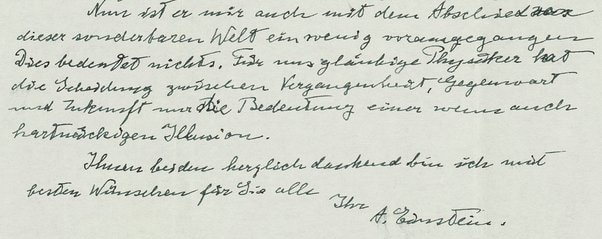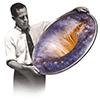The possibility of Time Travel is one of the recurring themes of the Townsend Brown story.
For example, consider this scene from Biscayne Bay – Chapter 31 of The Man Who Mastered Gravity. Morgan is sitting with Dr. Brown at his ‘Remote Lab’ in Homestead, Florida over the Christmas break in 1965:
“The next evening, or early morning – I wasn’t getting much sleep on this trip! – I found Dr. Brown at his desk. By then he was making me feel welcome, as if in his mind he had already ‘married me’ to Linda and I was his son. I remember thinking how weird all that was. After that afternoon on Biscayne Bay, we started to cover more topics than our previous conversations had covered. And then he dropped a bombshell on me.
“He said, ‘if it turned out that it would be possible to travel in time, what would you chose to do?’
“I’d go back and save my little sister.”
“He nodded and, after a bit of a pause he said, ‘but, if there are some natural rules against that, then what would you want to do?’
“All I could think to say was ‘I’d help whoever I would be allowed to help – and enjoy the adventure.’
“Dr. Brown just smiled. I finally asked him, ‘Is time travel possible?’ and he very simply answered, ‘Yes, I believe it is possible. In your lifetime.’
Whenever I encounter that last sentence, the first thing that comes to mind is the paradox of “time travel… in your lifetime.”
What Does ‘Time’ Even Mean?
If ‘time travel’ is possible ‘in your lifetime,’ then it is, by definition, possible, period. In your lifetime, in my lifetime, in everybody’s lifetime for all of time.
What does ‘time’ even mean if you can travel through it as freely as we travel through space?
If we accept for just a moment what Dr. Brown said to Morgan in 1965, then my suspicion is that he inferred to Morgan that it’s not the practicality of time travel that might be revealed in his lifetime, but the knowledge of that practicality. That statement that is loaded with another dimension speculation, since it surmises that a) the knowledge exists and b) that some body – or some thing – is withholding that knowledge.
But there it is – the sort of thing I wrestle with here in the rabbit hole.
The further inference is that Townsend Brown – by virtue of his affiliation with The Caroline Group – was privy to that knowledge.
Vastly oversimplified, the scientific principal that brings the topic of Time Travel to the Townsend Brown story is articulated in Chapter 20, Gravity & Electricity, Space & Time:
With the publication of his General Theory of Relativity in 1916, Albert Einstein tells us that massive objects like stars and planets bend, or warp, the space around them, and other planets or moons are held in their orbits by the resulting curvature.
Einstein gave us an explanation of how gravity works in the cosmos, but General Relativity lacks the kind of practical utility that men like Faraday and Maxwell gave us with the electromagnetic force. A century later, we can still do little with gravity besides fall down or drop things.
In the remainder of his life, Albert Einstein struggled to articulate a Unified Field Theory, the mathematical commonality in all the known forces in the universe. In particular, he sought to find the theoretical link between gravity and electromagnetism. Such a linkage would infer the ability to produce artificial gravity with electricity, and consequently the synthetic means to ‘bend’ space.
In his General Theory of Relativity, Einstein unified the three dimensions of space with the fourth dimension of time, redefining the fabric of the cosmos as ‘the spacetime continuum.’ So: if one can manipulate gravity with electricity, and that infers the bending of space, does it not also stand to reason that electrically induced gravity also implies the bending of time?
Einstein’s Final Thoughts on ‘Time’
Even Einstein surmised that time is “only a stubbornly persistent illusion.” To the family of his friend Michael Besso – who died only a few weeks before Einstein in 1955 – Einstein wrote:
Now he has again preceded me a little in parting from this strange world. This has no importance. For people like us who believe in physics, the separation between past, present and future has only the importance of an admittedly tenacious illusion.

Time’s arrow: Albert Einstein’s letters to Michele Besso | Christie’s
The Paradox of Time Travel?
Consider one other thing Dr. Brown said to Morgan in that passage in Chapter 20. When Morgan said he would go back in time in order to prevent his little sister’s drowning in a swimming pool accident, Dr. Brown said,
…if there are some natural rules against that, then what would you want to do?’
“Natural rules?” Perhaps Dr. Brown is referring to the Big Puzzle in the proposition: If you can go back in time and prevent your parents from meeting, how can you exist in order to go back in time in the first place? Or to cite a more contemporary dilemma, if a you can go back in time to prevent a pandemic, then there would be no pandemic go back in time to prevent.
Those always seem to be the kinds of quandaries that lead most to conclude that time travel cannot be possible.
Now comes a young mathematician from Australia to say to shed the paradox in a different light.

In a paper presented to the University of Queensland, fourth-year honor student Germain Tobar writes:
Einstein’s theory of general relativity predicts the existence of time loops or time travel – where an event can be both in the past and future of itself – theoretically turning the study of dynamics on its head.
Tobar seems to echo what Dr. Brown said to Morgan:
You can time travel, but you cannot do anything that would cause a paradox to occur.
Or as Einstein himself put it,
…the separation between past, present and future (is) only an… illusion.
Source: A Physicist Came Up With Math That Shows ‘Paradox-Free’ Time Travel Is Plausible : ScienceAlert
Additional reading: Leading Physicist Affirms TTBrown Discoveries

